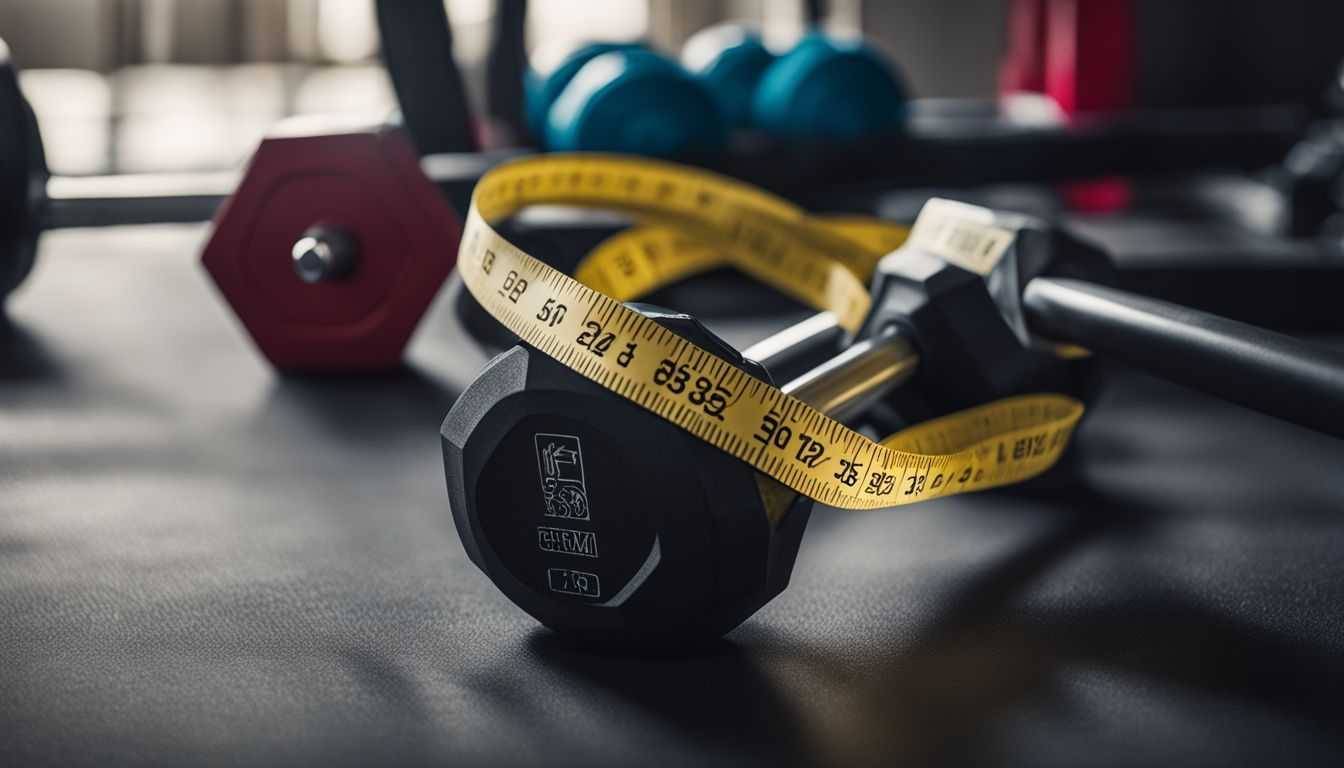You’re looking in the mirror, feeling lighter and leaner, but your scale is stubbornly stuck on the same old number? Remember, you’re not alone here. This predicament is something I’ve wrestled with myself – it’s more common than one might imagine.
Intriguingly enough, muscle does weigh more than fat so while we work hard to get that sculpted look and build lean mass, our body composition starts to change even if the scales don’t seem to waver a bit! In this blog post, we’ll dig into the puzzling world of why sometimes you lose inches and yet there’s no dip in weight – offering some genuine strategies about how you too can navigate this perplexing phenomenon.
Excited for some mystery solving? Let’s embark on an enlightening journey together!
Key Takeaways
- Losing inches but not weight can happen when you build muscle, as muscle weighs more than fat.
- Hormonal changes and water retention can also affect weight on the scale without impacting body composition.
- Losing inches is important because it means you are reducing body fat and increasing muscle mass, which improves your metabolism and overall health.
- Monitoring progress through measuring body fat percentage, noting how clothes fit, taking progress photos, and observing energy levels can provide a better understanding of weight loss success.
Understanding the Facts: Losing Inches But Not Weight

When it comes to losing weight, the number on the scale isn’t always the best indicator of progress. There are various factors that can contribute to losing inches but not seeing a significant change in weight.
Building Muscle
I push myself during workouts. My muscles grow and get stronger. This is called building muscle. It can make me weigh more, but I look thinner. Even if my weight does not go down, I am still losing fat.
Muscles are denser than fat, which is why they take up less space in the body. Building muscle and losing fat at the same time can cause lost inches without a change in weight.
Hormonal Changes
Hormones run our bodies. They set rules for how our bodies work. Sometimes, hormones change and our bodies keep more water than usual. This can make us see higher numbers on the scale without gaining fat or muscle.
Reproductive hormones in women can cause this change every month. During their cycle, some women may hold onto more water in their body. This might look like a lack of weight loss on the scale, even if they are losing fat.
Many drugs can also shift your hormones and affect your weight. Birth control pills, beta-blockers and anti-inflammatory meds might make you retain water too! But remember, holding more water doesn’t mean you aren’t getting healthier or slimmer.
Inflammation
Inflammation can get in the way of losing weight. Some foods cause it, and that’s not good for your health. Your body may puff up because of this swelling. This puffiness looks like extra weight on your body scales.
After a hard workout, your muscles also swell up a bit as they fix small tears from exercise. This is usual and healthy, but it can add to your water weight for a while. Muscle glycogen goes up when you do strength training, leading to more heavy water in your muscles.
So don’t worry if the scale doesn’t show less pounds right away after working out – give it time!
Water Retention
Our bodies hold water. This is called water retention. It can make you weigh more but not look bigger. Hormones can make your body keep more water. Working out hard does this too, because it makes your muscles swell up with water to heal them.
Why Losing Inches Can Be More Important Than Losing Weight

When it comes to weight loss, the number on the scale isn’t always the best indicator of progress. Losing inches can actually be more important than losing weight because it shows that your body composition is changing.
As you build muscle and lose fat, you may not see a significant change in weight, but your body shape and overall health can improve.
Losing inches means that you’re reducing your body fat while increasing muscle mass. This is beneficial because muscle burns more calories at rest than fat does. So even if the scale doesn’t move much, having more muscle can help boost your metabolism and make it easier to maintain or continue losing weight.
Additionally, losing inches can lead to a toned and sculpted appearance. You may notice that your clothes fit better and that you have improved strength and endurance. These physical changes are often more motivating than simply seeing a lower number on the scale.
Remember, everyone’s journey is different, so don’t get discouraged if you’re losing inches but not seeing drastic changes in weight right away. Focus on how you feel physically and mentally, as well as any improvements in measurements or clothing size.
Celebrate these victories along the way!
Factors That Can Influence Weight Loss

Diet, exercise, and medications are factors that can significantly impact weight loss.
Diet
To address the issue of losing inches but not weight, it’s important to look at our diet. Certain foods can cause bloating and water retention in our bodies, which can make us feel bigger even if we’re losing inches.
Identifying these specific foods that cause inflammation and bloating can be done through elimination and tracking our meals using apps like MyFitnessPal. Additionally, certain medications such as anti-inflammatory meds, beta-blockers, and birth control pills may also contribute to water retention.
Therefore, being mindful of what we eat and how it affects our bodies is crucial for achieving weight loss goals.
Exercise
Exercise plays a crucial role in losing inches and improving overall health. Regular physical activity, especially resistance training or strength training, helps build lean muscle mass while promoting fat loss.
As you engage in exercise, your muscles work harder and may experience micro-tears on the fibers, leading to muscle soreness. This process not only aids in building strength but also boosts your metabolism and helps burn calories even at rest.
Additionally, exercise improves cardiovascular endurance, increases energy levels, and contributes to a toned body appearance. So don’t forget to include regular exercise as part of your weight loss journey for optimal results!
Medications
Certain medications that you may be taking can have an impact on your weight loss journey. Medications like anti-inflammatory meds, beta-blockers, and birth control pills can cause water retention, which can result in losing inches but not weight.
These medications may affect your body’s ability to shed excess water and contribute to bloating. It is important to keep in mind that everyone’s body reacts differently to medications, so it’s essential to consult with a healthcare professional if you have concerns about how your medication might be affecting your weight loss progress.
Possible Reasons for Losing Inches But Not Weight
Gaining muscle mass can be one reason why you are losing inches but not weight.
Gaining muscle mass
Gaining muscle mass is one possible reason why you may be losing inches but not weight. When you engage in strength training exercises, your muscles can become stronger and more developed.
As a result, your body composition changes, with fat being replaced by lean muscle tissue. While this can lead to inches lost and a toned appearance, the number on the scale may not change significantly because muscle weighs more than fat.
So even though you’re getting smaller, the scale might not reflect it accurately. Keep in mind that gaining muscle has numerous benefits such as boosting metabolism and improving overall health.
Inconsistencies in weighing
When it comes to monitoring weight loss, inconsistencies in weighing yourself can lead to confusion. Your body weight can fluctuate throughout the day due to factors like water retention, food intake, and bowel movements.
This means that your scale readings may vary depending on when and how often you weigh yourself. It’s important to establish a consistent weighing routine, such as weighing yourself at the same time each day or week under similar conditions.
This will provide a more accurate representation of your progress and help you track any changes in inches or weight over time. Remember, losing inches but not weight could still mean you’re making positive changes in your body composition by gaining muscle and losing fat.
Increased bone density
Increased bone density is another reason why you might be losing inches but not weight. When you engage in activities like resistance training or strength exercises, it can lead to an increase in muscle mass and also stimulate bone growth.
This increased bone density may not show up on the scale because bones are denser than fat. However, it contributes to a more toned body and can boost your metabolism. So even if the number on the scale doesn’t change much, don’t overlook the positive impact that increased bone density can have on your overall health and body composition.
Keep track of your progress by taking regular progress photos and measuring specific areas of your body to see changes in bone density over time.
Effective Ways to Monitor Weight Loss Success

There are several effective ways to monitor weight loss success, including noting how clothes fit, measuring body fat percentage, taking progress photos, and observing energy levels and overall health.
Read on to discover these helpful tips!
Noting how clothes fit
When it comes to monitoring weight loss success, one effective method is noting how clothes fit. Instead of solely relying on the number on the scale, pay attention to how your clothing fits and feels on your body.
As you lose inches and reduce body fat, your clothes may start to feel looser or fit better. This is a positive indication that you are making progress towards your weight loss goals, even if the scale doesn’t show a significant change.
So next time you’re assessing your progress, don’t forget to take into account how your clothes are fitting as well!
Measuring body fat percentage
Measuring your body fat percentage is an important way to track your weight loss progress. It gives you a better understanding of how much fat you’re losing, as opposed to just looking at the number on the scale.
When you lose weight, it’s possible that some of that weight could be muscle or water instead of fat. By measuring your body fat percentage, you can see if you’re actually losing fat and not just overall weight.
One effective way to measure body fat percentage is through bioelectrical impedance analysis, which uses electrical currents to estimate your body composition. Another option is getting a DEXA scan, which provides a more accurate assessment of your bone density and muscle mass along with body fat percentage.
Remember, don’t solely rely on the scale when tracking your progress – measuring body fat percentage can give you a clearer picture of how well you’re doing in achieving your weight loss goals and improving overall health.
Taking progress photos
Taking progress photos can be a helpful way to track your weight loss journey. By taking weekly photos of yourself and measuring different body parts, you can see the changes happening over time.
It’s a visual representation of your progress and can help keep you motivated. Plus, it provides a comprehensive view of how your body is changing beyond just numbers on a scale. So grab that camera or use your smartphone to capture those before-and-after shots – you’ll be amazed at the difference!
Observing energy levels and overall health
During your weight loss journey, it’s important to pay attention to how your body feels and functions. One way to do this is by observing your energy levels and overall health. As you start losing inches but not necessarily seeing a significant change in weight, monitoring your energy levels can help determine the effectiveness of your weight loss program.
Are you feeling more energized and less sluggish throughout the day? This could be a positive sign that you’re losing fat while building muscle, which can lead to increased energy levels and overall improved health.
It’s also essential to assess how other aspects of your well-being are improving, such as better sleep quality or a decrease in inflammation-related symptoms like joint pain or bloating.
What to Do If You’re Losing Inches But Not Weight
If you’re losing inches but not weight, there are a few steps you can take to address the issue and continue progressing towards your weight loss goals.
Avoid daily weighing
Daily weighing can be discouraging and may not provide an accurate picture of your progress. Your weight can fluctuate throughout the day due to factors like water retention, digestion, and hormonal changes.
Instead of focusing on daily weigh-ins, try to track your progress over time by using other methods like measuring how your clothes fit or taking body measurements. These methods can give you a better understanding of how your body is changing even if the number on the scale isn’t decreasing as quickly as you’d like.
Remember that weight loss is not always linear and can vary from person to person. Stay consistent with your healthy habits and trust in the process.
Maintain your exercise regimen
To continue losing inches and improve your overall health, it’s important to maintain your exercise regimen. Regular exercise helps burn calories, build muscle, and increase metabolism.
Choose activities you enjoy, like walking, jogging, or dancing, as this will keep you motivated to stick with your routine. Aim for at least 150 minutes of moderate-intensity aerobic activity per week, along with strength training exercises two or more days a week.
Consistency is key in achieving long-term weight loss success and maintaining a healthy lifestyle. So keep moving and stay committed to your exercise program!
Ensure a balanced diet
To ensure a balanced diet, it’s important to focus on eating a variety of nutritious foods. This means including plenty of fruits, vegetables, whole grains, lean proteins, and healthy fats in your meals.
A balanced diet provides your body with the essential nutrients it needs to function properly and support weight loss. It can also help you feel satisfied and full for longer periods of time, preventing overeating or cravings for unhealthy snacks.
By choosing nutrient-dense foods and practicing portion control, you can create a calorie deficit without depriving yourself of key nutrients. Remember that a balanced diet is not just about losing weight; it’s about nourishing your body and improving overall health.
Conclusion
In conclusion, losing inches but not weight can happen due to muscle gain and hormonal changes. It’s important to focus on body composition and overall health instead of just the number on the scale.
Tracking progress through measurements, body fat percentage, and energy levels can help gauge success. Remember to avoid daily weighing, maintain consistent exercise, and follow a balanced diet for long-term results.
Keep your goals in mind and stay motivated throughout your weight loss journey!
